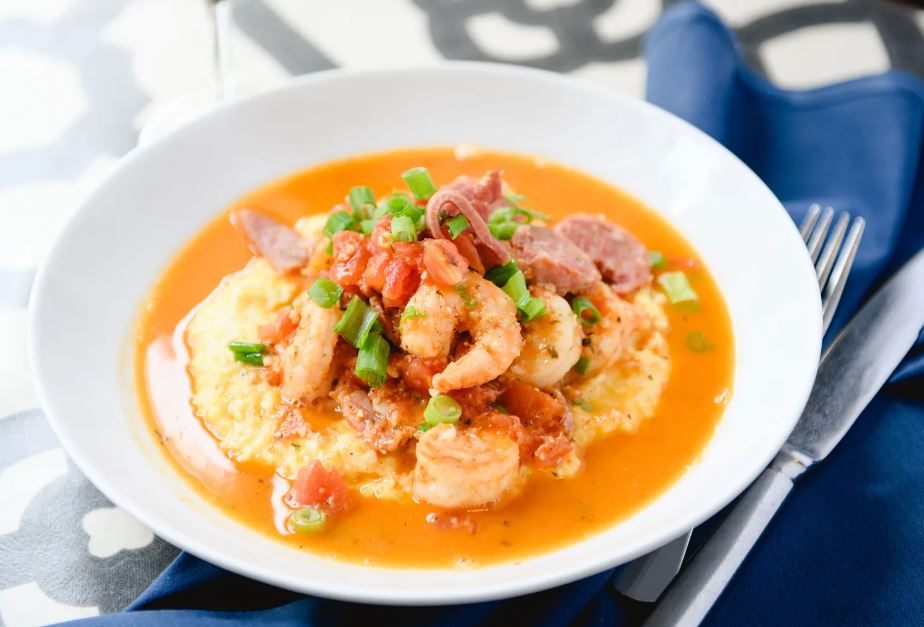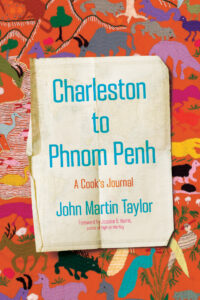
By Andy Brack | Sometimes, it’s not all about Republicans and Democrats. Sometimes, at least in the South, it’s just about food. Witness all of the recent thankfulness and carb-laden gluttony in homes across the Palmetto State, where tasty food is aplenty.
 Now comes a culinary treasure for which we must sing hearty praises – food historian John Martin Taylor’s new book of essays, Charleston to Phnom Penh: A Cook’s Journal. This collection of musings, some previously published, is a 240-age celebration of a life rooted in the South Carolina Lowcountry and influenced by food and wine from the Caribbean, France, Italy, eastern Europe and Cambodia, where Taylor now lives.
Now comes a culinary treasure for which we must sing hearty praises – food historian John Martin Taylor’s new book of essays, Charleston to Phnom Penh: A Cook’s Journal. This collection of musings, some previously published, is a 240-age celebration of a life rooted in the South Carolina Lowcountry and influenced by food and wine from the Caribbean, France, Italy, eastern Europe and Cambodia, where Taylor now lives.
Taylor tells stories of 1960s food-focused trips as a boy from Orangeburg with his intellectual parents to then exotic American locations like New York and California. They might stay in modest hotels, he wrote, but they didn’t skimp on the food. When the family moved to Orangeburg from Louisiana when Taylor was young, his parents worried about where they’d get good wine – not the standard fare of Southerners of that day.
 By the mid-1970s, Taylor was in graduate school at the University of Georgia where he happened to be friends with the nascent B-52s (they’re still friends today). “My apartment was occasionally the scene of wild dance parties. We would take turns manning the turntable because all our recordings were on vinyl.” He and his buddies would dance to everything from Motown to New Wave to old-time rock ‘n roll. Even today, he dances. “The kitchen is my dance hall. I have arthritis and a fake knee, but it is simply impossible for me NOT to dance to Junior Walker’s “Shotgun.” (Go give it a listen now and see if you can resist.)
By the mid-1970s, Taylor was in graduate school at the University of Georgia where he happened to be friends with the nascent B-52s (they’re still friends today). “My apartment was occasionally the scene of wild dance parties. We would take turns manning the turntable because all our recordings were on vinyl.” He and his buddies would dance to everything from Motown to New Wave to old-time rock ‘n roll. Even today, he dances. “The kitchen is my dance hall. I have arthritis and a fake knee, but it is simply impossible for me NOT to dance to Junior Walker’s “Shotgun.” (Go give it a listen now and see if you can resist.)
We met Taylor more than two decades ago on a languid porch at a historic Lowcountry plantation party where we immediately bonded over shrimp, drinks and lots of laughter. At the time, he was researching and writing about Southern foodways before Charleston was a foodie town. He also had a cookbook store, Hoppin’ John’s, at the corner of Anson and Pinckney streets in Charleston where you could sniff the pungent smells of carriage horses on any particularly ripe day. Back then, Taylor explored food in books and for national publications in ways that were new and exciting.
These days In Charleston, you can’t walk a block without tripping over a restaurant serving creamy shrimp and grits. But back in the 1980s, the city’s cuisine was much different – duller, standard fare without the emphasis on high-quality ingredients or the farm-to-table ethic.

In an essay from 2008, Taylor describes the rediscovery of stone-ground, heirloom grits. “Most folks I knew were eating Quaker or Jim Dandy grits. Nasty stuff. No fat. No flavor. No wonder Yankees hated it. But I knew better, as do grandmothers from the entroterra and, as in the States, there is a movement to preserve the old folkways and dishes that have all but disappeared. Farmers are growing tasty heirloom varieties of corn, and mills are grinding the whole grains …
“I’m proud to have been a part of this movement and to have restored Shrimp and Grits to menus in Charleston, where, before my arrival there in the late 1980s, not a single restaurant that I know of was offering it.”
The book includes more than two dozen recipes that Taylor has collected through the years, including one for “gamberetti con polenta,” or shrimp and grits. The big keys: Use good grits and a stock that includes the heads and shells from fresh shrimp.
As culinary historian Jessica B. Harris writes in the book’s foreword, Taylor “became one of the country’s first purveyors of stone ground grits; one of the founding saints of the fresh, regional,
and local movement; and a voice to be reckoned with in a world of southern food.”
If you’re a lover of our regional dishes and you haven’t yet met John Martin Taylor through his multiple cookbooks, grab his latest book. And great goodness, don’t forget to try his recipes.
Charleston to Phnom Penh: A Cook’s Journal is published by USC Press. Its publication date is Nov. 29, 2022, but you can get it now online.
Andy Brack is editor and publisher of Statehouse Report and the Charleston City Paper. Have a comment? Send to: feedback@statehousereport.com.


